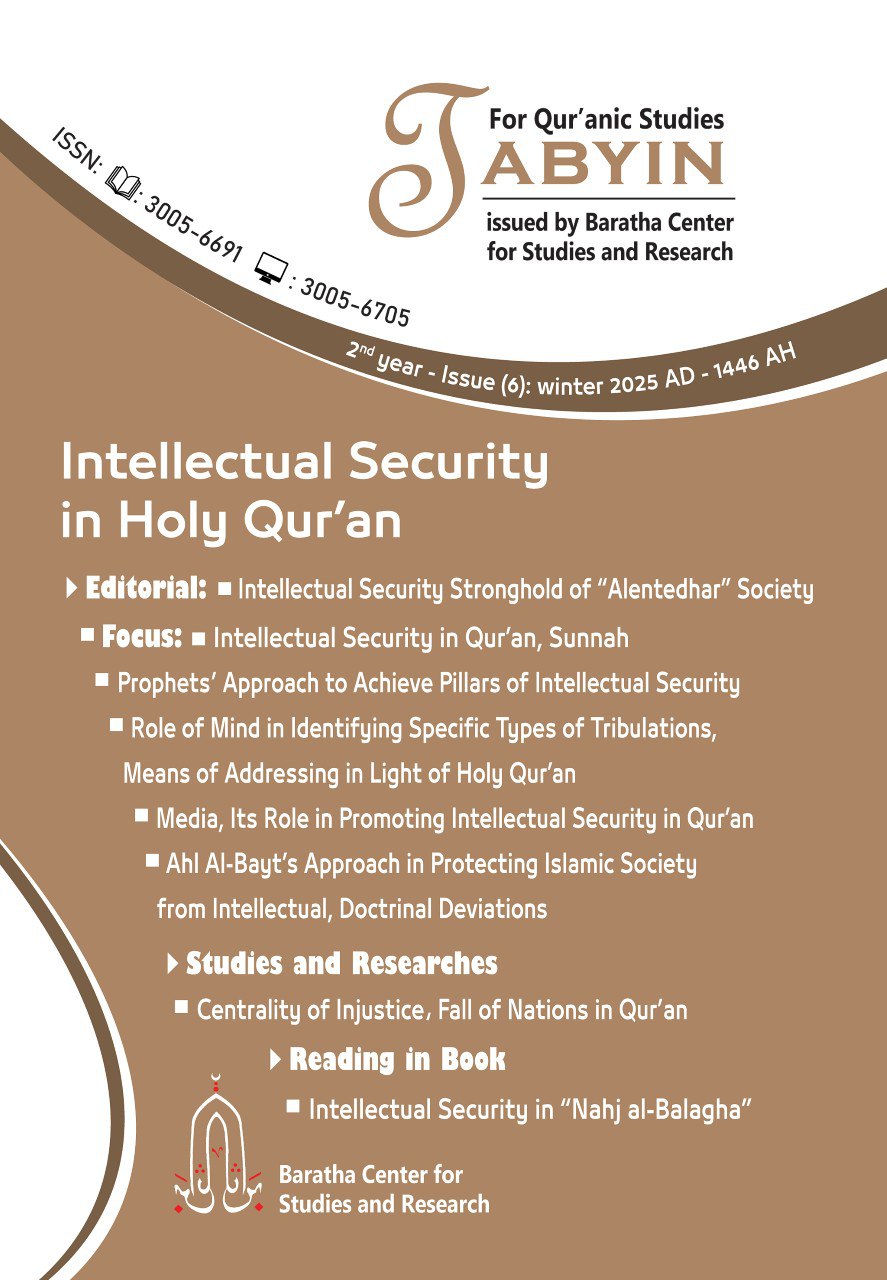
The threats facing humanity are no longer limited to military wars or economic crises, minds themselves have become arenas of conflict, where misleading ideas are planted, and the ability to distinguish between truth and falsehood is taken away.
The Holy Qur'an has pointed to this fact for centuries, emphasizing
that the real struggle is not merely between political or economic
powers, but between a sound vision of existence and deviant
perceptions that mislead people from their true purpose.
Allah, Almighty, says: {And do not pursue that of which you have no knowledge. Indeed, the hearing, the sight and the heart, about all those will be questioned.} [Al-Isra, verse: 36].
This study attempts to explore the concept of "intellectual security" through the Holy Qur'an and the Sunnah, in light of the challenges Islam faces in its doctrinal, legislative, and moral systems, and the challenges of Western cultural and media globalization. The first part discussed the concept of intellectual security from an Islamic perspective and its fundamental foundations: the Qur'an, the Sunnah, and mind.
The second part reviewed the most important obstacles to this security, and how to confront them, based on the teachings of the Holy Qur'an, and the guidance of the Prophet's Sunnah. These include: disabling the mind, blindly imitating forefathers, extremism, and following conjecture, etc.
The study concluded that 'adhering to the guidance of Allah' is the key to achieving intellectual security on both the individual and societal levels.
In this study, we explain the Islamic approach, who was led by the father of the prophets, Abraham (peace be upon him), to achieve true, prophetic security. He built " Holy Kaaba" with complete certainty based on this approach, hoping that Allah, Almighty, would grant apparent and hidden security to all corners of the world. This security is achieved through correct belief and the reorientation of human thought toward monotheism and complete servitude to Allah, Almighty. This creates human intellectual and ideological security, enabling all the goals of the divine messages on earth to be realized.
It enables one to adopt sound positions, drawing upon the divine gifts and innate faculties bestowed by Allah, Almighty, capabilities that qualify the human being to engage in thoughtful moral judgment. The efficacy of mind, however, is contingent upon the intellectual and ethical nourishment it receives. The more a mind is cultivated upon sound foundations and noble moral principles, the more luminous, accurate, and pure its outcomes, clear very much.
This study endeavors to underscore the pivotal role of reason in identifying nuanced and qualitative tribulations (Fitan Naw‘iyya), formulating prudent responses that shield one from falling into their snares, and proposing constructive pathways for resolution. Such an approach contributes to guiding the individual toward righteousness and secures their success and salvation in both this life and the hereafter.
it seeks to explore the Qur'anic approach to addressing discourse, reporting, and confronting intellectual deviations, analyzing how these characteristics can be activated in a contemporary media reality. The research also pays special attention to youth, the group most affected by media influence.
It highlights the necessity of shifting from spontaneous media action to a conscious Quranic media project, which embodies the values of the message in its language, tools, and objectives, based on a delicate Quranic balance that combines warning and evangelism, addressing the mind and impacting the conscience.
The conclusion is some practical proposals that pave the way for setting both faithful and modern media.
As human life continues to evolve across various dimensions, it constantly brings about new realities and challenges. In light of this, Islam, meant to serve, as a lasting and timeless way of life, must be rooted in principles that can protect society from the deviations that may arise over time. This matter is of such significance that identifying these foundational principles becomes imperative, especially in our present era. Since true Islam, in its authentic form, is derived from Ahl al-Bayt (peace be upon them), presenting the foundations for protecting Islamic society through their approach represents the most reliable path to confronting the deviations that threaten the course of genuine Mohammadan Islam.
This study aims at highlighting the major role of injustice, as a key reason for destruction and punishment in the Qur'an. It finds that the downfall of nations and communities is linked to their involvement in injustice. This destruction happens only after warnings, guidance, and enough time for change have been given. It does not occur randomly, but follows precise divine laws, ensuring that no one is wronged. Moreover, this destruction serves as a lesson for future generations, possibly guiding them to righteousness, and away from injustice.
Thus, the Muslim's religion and knowledge of it are preserved both in thought and behavior. Although this term is of recent origin and usage, a closer examination of its background reveals that it has many prior historical impacts, implications, and extensions.
This book sheds light on a vital and ever-present topic: intellectual security. It covers this topic in its entirety, based on historical standards, texts, and events, highlighting in a standardized manner the sermons and words of Imam Ali (peace be upon him) contained in "Nahj al-Balagha" on this matter.
It also shows that the nation's salvation and advancement depend on the necessity of ridding its historical arenas of all intellectual impurities, and the negative effects of deviant and misguided historical visions, which have continued to dominate and control minds and behaviors in many aspects of this nation and its historical and present contexts.
Comments